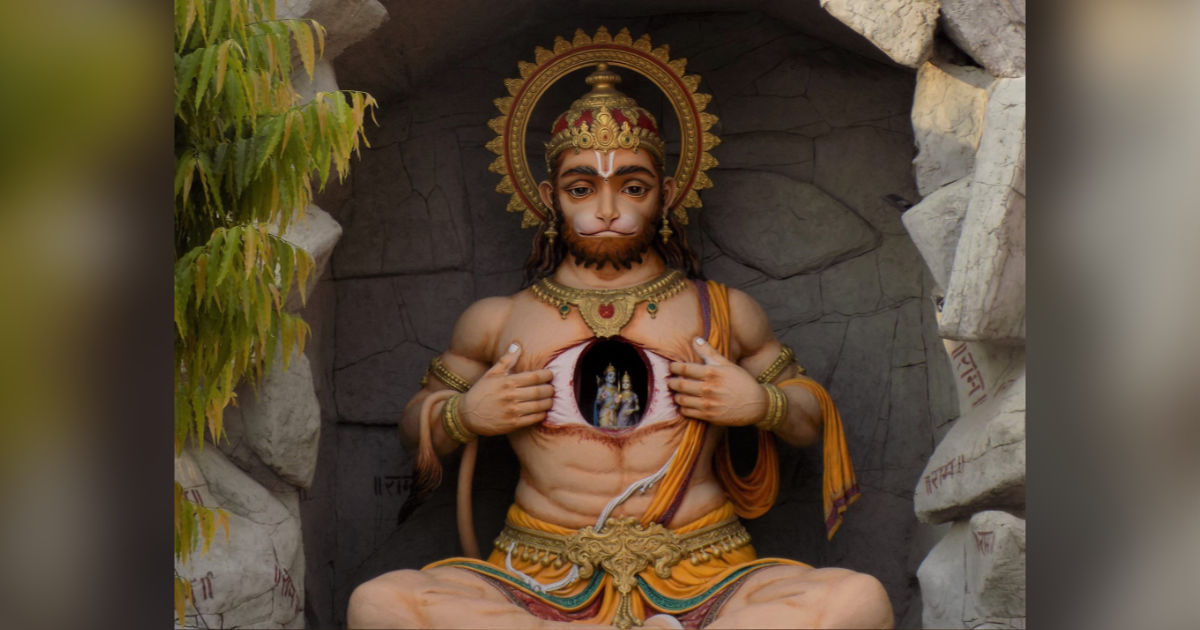Hanuman has many titles. Each one speaks about his different virtues and how they reflect his divine powers. Continue reading
Tag Archives: happiness
865 – Mantras to chant during Navratri
It is believed that during Navratri, the Goddess principle is very active. Chanting ‘Sri Durga Deviyai Namaha’ during this period will grant immense spiritual benefit. Continue reading
855 – The Easter Bunny
I met a little rabbit once,
A hopping on his way.
I said, ‘Where are you going on such a lovely day?’
He said with just the slightest frown,
Don’t hinder me I pray!
I am taking round the Easter Eggs,
Because it’s Easter Day. – Anonymous
725 – Osho on happiness
Happiness depends on unhappiness. Bliss is transcendence: one move beyond the duality of being happy and unhappy. One watches both; happiness comes, one does not become identified with it. One does not say, I am happy. Peace, it is wonderful. One watches a white cloud passing. And the one watches a black cloud passing. You are the witness, the watcher.
703 – What is better, laughter or prayers?
Laughter is far more sacred than prayer, because prayer can be done by anyone, it does not require much intelligence. Laughter requires intelligence, it requires presence of mind, a quickness of seeing into things. In deep laughter the ego disappears if the ego is there it will keep you serious. – Osho
641 – Happiness
How does one gain the state of bliss, ever devoid of misery.
Ramanna Maharishi said that apart from the statement in the Vedas that wherever there is body there is misery, that is also the direct experience of all people. Therefore, one should enquire into one’s true nature and one should remain as such. This is the means to gain that state. Continue reading
593 – Piglet and his heart
Piglet noticed that even though he had a very small heart, it could hold a large amount of gratitude. – A.A. Milne
My dear ones, let us think of all the things that make us cheerful, joyous, and elated. We only and recall the misfortunes which enwrap us like a wet blanket. Continue reading
588 – Where the mind is without fear
Where the mind is without fear
And the head is held high
Where knowledge is free
Where the world has not been broken into fragments
By narrow domestic walls
Where words come out from the depth of truth
Where tireless striving stretches its arms towards perfection
Where the clear stream of reason has not lost its way
Into the dreary desert sand of dead habit
Where the mind is lead forward by thee
Into ever-widening thought and action
Into that heaven of freedom, my
Father let my country awake. – Rabindranath Tagore
This poem was written by Rabindranath Tagore during India’s pre-independence days. The poet is writing that a country should have people living without fear and with dignity. Continue reading
478 – Happiness makes you your own person
Find your roots within yourself. If you belong to a crowd, there is no further growth. You are dependent on others for company and this gives you anxiety. You seek groups, organizations to give you an identity. It is described as social anxiety and it is discussed intensely. What one is forgetting is how is one connected to oneself. Continue reading
412 – Truth and Morality
Our parents, our teachers and our elders elucidated never tell an untruth. I did not attach any importance to it as I never lied to my mother. My father was very strict and so in self-defense or to protect a sibling one lied. Morality was a word also used a great deal and one thought that it was associated with character. When I had my own children, I realized how important it was to tell the truth, and what was the actual meaning of morality. Continue reading
369 – One verse poems
Written by the first Buddhist nuns.
Punna – Spoken by the Buddha to her.
The name you are called by means full, Punna,
So be filled by the good things, like the moon when it is full,
Break through all that is dark with wisdom made full. Continue reading
341 – Devi Prayer
Devi Stuti
Ya Devi sarva bhuteshu shanti rupena sangsthita
Ya Devi sarva bhuteshu, Shakti rupena sangsthita,
Ya Devi sarva bhuteshu, matri rupena sangsthita,
Ya Devi sarva bhuteshu, buddhi rupena sangsthita,
Namastasyai, Namastasyai, Namastasyai namo namaha. Continue reading
090 – Space in my head and heart
This morning I had an argument with my husband. He was complaining that there was no space in the house. He prefers to practice his sadhana downstairs and I practice upstairs. Our home is full of books and they are everywhere. I responded to his remark by saying that you must have space in your heart and head. Space is relative. You can feel crowded in a mansion and free in a tiny room. Continue reading
Yoga talk with Swami Yogaswarupananda – Rishikesh – Manipur Univesity
Swami Yogaswarupananda from Rishikesh / Manipur University talks about yoga, krishna,  bhagavad gita and much more.
bhagavad gita and much more.
Here you can find:
Our online channels:
You can donate here
💛 Om Shanti 🕉
Podcast: Play in new window | Download
Subscribe: RSS
“Upasana Yoga and Nondual Devotion” – Yoga of Love – James Swartz
Nondual love means unconditional love. Maturity is important for a love
relationship. Free will and love. Means of knowledge. In the final stage you get rid of obstacles.
Here you can find:
Our online channels:
You can donate here
💛 Om Shanti 🕉
Podcast: Play in new window | Download
Subscribe: RSS















